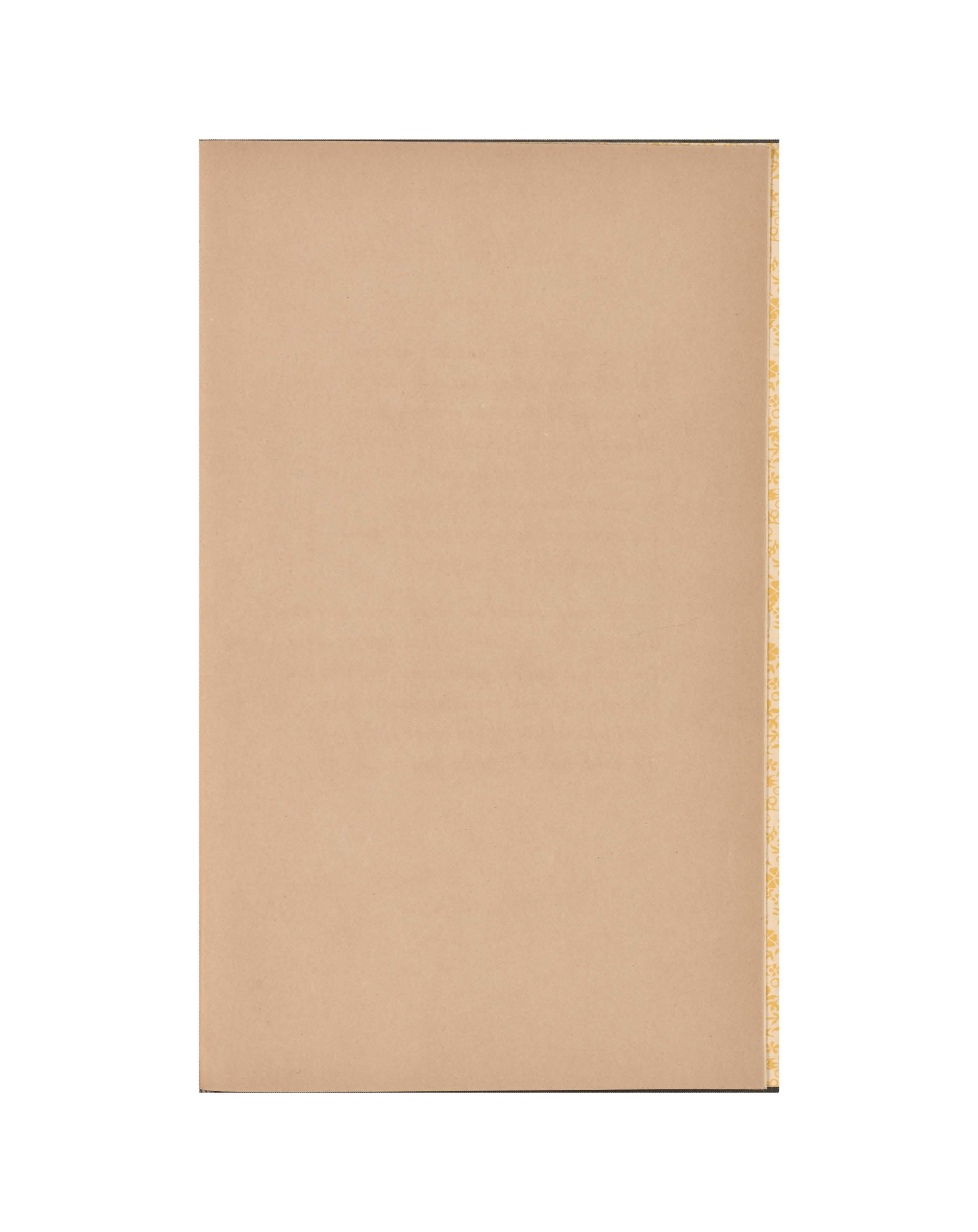
SuE CooK McCLURE,Editor-in-Chief; LoursE CowHERD,Associate Editor; MARGARETWATKINS,Business Manager;
Art Editor; EsTHER WALSH,Exchange Editor; PAGEJoHNSTON,Assistant Editor.
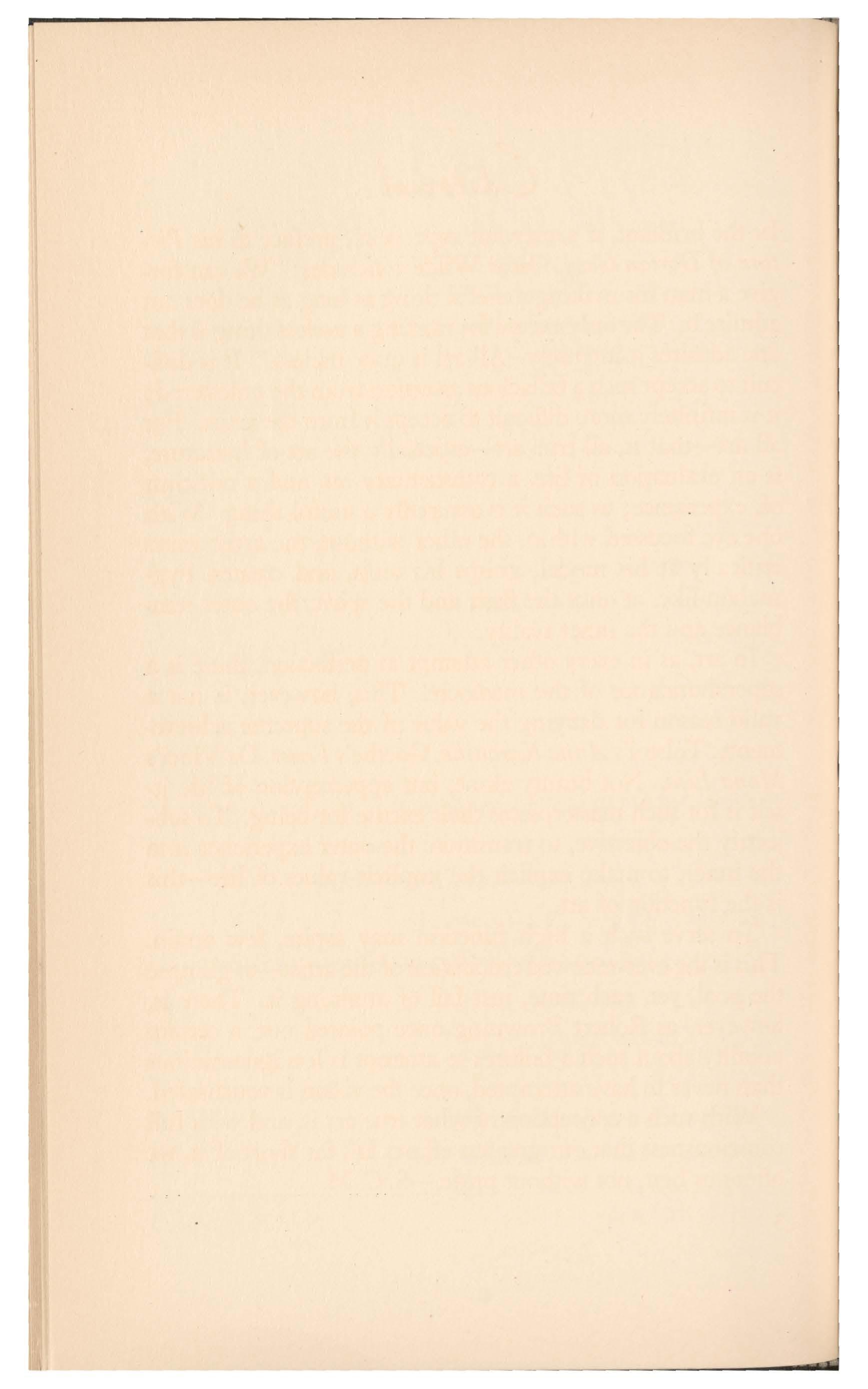

IN the brilliant, if somewhat superficial, preface to his Picture of Dorian Gray, Oscar Wilde concludes: "We can forgive a man for making a useful thing as long as he does not admire it. The only excuse for making a useless thing is that one admires it intensely. All art is quite useless." It is difficult to accept such a fallacious assertion from the unlettered; it is infinitely more difficult to accept it from the artist. F9r all art-that is, all true art-especially the art of literature, is an evaluation of life, a commentary on, and a criticism of, experience; as such it is assuredly a useful thing. With one eye focussed within, the other without, the artist gazes critically at his model, grasps his tools, and creates, Pygmalion-like, at once the flesh and the spirit, the outer semblance and the inner reality.
In art, as in every other attempt at perfection, there is a superabundance of the mediocre. This, however, is not a valid reason for denying the value of the supreme achievements: Tolstoi's Anna Karenina, Goethe's Faust, Da Vinci's Mona Lisa. Not beauty alone, but apperception of life it-· self is for such masterpieces their excuse for being. To subjectify the objective, to transmute the outer experience into the inner, to make explicit the implicit values of life-this is the function of art.
To serve such a high function may aspire, few attain. This is the ever-renewed crucifixion of the artist-to glimpse the goal, yet, each time, just fail of attaining it. There is, however, as Robert Browning once pointed out, a certain nobility about such a failure: to attempt is less ignominious than never to have attempted, once the vision is vouchsafed.
With such a conception of what true art is, and with full consciousnessthat our greatest efforts fall far short of it, we offer our best, not without pride.-S.
C. M.

BY BEVERLEY BATES
Out from the shadows of the purple curtain, Straight from the darkness, a dancer leaps. With him comes the freedom of wild forests; In him the tiger's mighty spring.
(Oh, thoughts of morning skies and brave youth Marching up the hills to conquer life.)
His hands speak; The turn of his head is a songT he lift of an arm, The pause of a foot, The turn and the thrust, The strong swing-
( And the past awakes evith the beat of the drum And the fear of the dark and the storm,)
And moving still, turning, pausingLeaping, running, gently pausing,
(He weaves the beauty of life's patterns; The light on dark, flash of colors.)
Into the shadows of the purple curtain Straight into the darkness, a dancer leaps.

BY JANE MEAD
A LIGHT wind ·caught at my clothes moulding them to me, and, as I stood atop the Pyramid of the Sun, I watched little puffs of dust being scared up in the valley below. There were two small regions partially excavated down there to reveal the mysterious grandeur of monuments erected by our American predecessors. These clearings were, however, but a few hundred feet in an extensive area of unexcavated territory, four miles of mounds holding secrets of untold ages. It was a clear day, and, in the distance, Popocatepetl, guardian of the Valley of Mexico, glistened in the afternoon sun. Nearer, mountains cast dense blue shadows across the plateau to make a frame for our lost city of San Juan Teotihuacan. What was this pile of stone upon which I stood and to whom did it belong? Its stability mocked at our modern skyscrapers. What pageants it must have witnessed before we came to bare its surface that we might gaze dumbly upon it!
The long row of weathered heaps at the pyramid's base was referred to as La Avenida de los Muertos, or A venue of the Dead. I questioned the propriety of that name for, although the tombs, each one a cone of at least twenty feet in height, contained human bones and evidences of creatures physically dead, the souls of those unknown individuals were alive in their architecture. The mad beauty of their temples evidenced that. The fierce serpents and wild designs on the Temple of Quetzalcoatl were created by men certainly far more artistic and with natures infinitely wider in scope and conception than the modern artisan who calls himself a sculptor. Those men of the ancients ardently believed in their God of the Wind who swept the heavens 5

dry for Fire and Water. In their representations of him they have preserved for us one corner of their souls.
I tried to view the ambitions of our nation today. Have we, as a people, any common desire that could bind us into a unity or give our country a character? Our love of personal individuality forbids it. What is there in our civiliization at this stage of its development which will prove anything concrete about us to the curious of future ages? I thought of science, but science is not yet out of its childhood and would perish in the test. Perhaps our whole civilization is still too young to have formulated any enduring features. We have only to scratch the surface of the remains along the A venida de los Muertos to find great ancient tribes superimposing one upon the other their gifts to posterity. They have left to us a strong challenge embodied in their art and architecture. What will evolve from us to pass on to the ages?
The wind had increased, bringing with it black clouds to protect the unknown city from the sunlight. The daily storm was ready to begin, but, as I descended, I saw from my observation point the glow of a clear day beyond the mountains where the storm had abated.

BY FRANCES FLICK
Sweet-lipped Sappho is dead. With pity, yea with anguish, Gaze on the troubled rocks, The oily waters that languish On the Ionian tide. Gone is Lesbos' pride.
Now mourn, all ye that sing; Lay down your muted lyre here; Shatter the barbitonH er lover, scorning her fire here, Drove her to such a death, Stified that sweet breath.

BY JO ANN KENT
I HAVE always been romantic about gipsies. People tell me that they are really a dirty, unprogressive race, musical, but otherwise limited to stealing and superstition. They say, moreover, that it is unprogressive to be romantic about gipsies, that factories and airplanes should be admiredspeed, streamlines, and skyscrapers. They say, too, that traveling is a hypnotic delusion: one imagines that by moving, one is getting somewhere-in reality, it is only an escape.
I know-but if I pass a fair by streamline, or by airplane, I have to halt, mount a wooden horse, and knock down a coconut. I always sigh when a circus goes on without me. And I have another mania, which is moving. I have never lived in a house more than three months, for my mother also is a house-hunter. If she hears of a ruined tower or a lighthouse or a barn, she desires it, furnishes it, plants a thousand bulbs, and leaves it for another. The process is even quicker with me. Desire and disillusion are almost simultaneous; so I need no furniture, plant no tulips.
Instead of fighting these foolish passions, we-mother and I-combined them by the purchase of a caravan-a modern trailer van, it is true, drawn by a Ford. (The lean white horse remains a symbol.) Having a cosy corner in our hearts for the romantic South, we headed our van to Virginia.
Our start from Washington was not ideal. We loaded the van with luggage, waved good-bye to our friends, and broke down immediately, spending twelve hours in a garage to get the moorings strengthened. We had to drive most of the night to reach our destination in the morning.

We lurched and crawled; the van seemed a heavy burden, yet flimsy and unreliable. It was bitterly cold, for we could not master the camp cooker, which spat and exploded. The floor space was cluttered with luggage; rain drummed threateningly on the roof. In the morning the water was frozen, and there was a confusion of routes.
But we finally arrived at our first stop-the home of one of mother's dearest friends. We rested, luxuriating already in the comforts of a real house. How well they live in the South-with a greater mellowness than in other places! As mother says, "The cocktail there is not a frenziedly shaken summons to the woman's thin diet and the tired man's pleasures, but a radiance by the fire after hard exercise in ram and wind."
We stayed four days in Virginia, then took regretfully to the road (mastering the camp cooker). Traveling southward, away from winter, we found warmer rains, softer winds. We went to Charleston and the beautiful melancholy gardens of magnolias and camellias and trees that hang long hair over the swamps. Charleston and New Orleans we found a little sedate and colorless, having imagined black people in bandannas dancing beside the sea. But the gradual warming and slowing up, the softness of the air and speech there have charm.
It was warm enough to sleep outdoors, and that I love. We dragged our duffel-bags on the grass by a whippoorwill wood and watched the rising of the moon and the sun. It is not always easy to find a camping place. My romantic propensities led me to imagine an ideal dell with a stream -but, often, we had to content ourselves with the back of filling stations and auto camps. At first, we visited an occasional hotel, but soon became rooted to the van. We parked in vacant lots in the middle of a city; we developed an eye for deserted houses and firewood (deserted). The life of 9

the mind was neglected; we did not read or write-we traveled, cooked, washed up, and slept.
As a cook, I am still in the steak-and-bacon class. I can cope with eggs, but not with chickens. Cooking outdoors is my specialty. It takes many hours, sometimes from dawn to midnight-I don't know why. Collecting the wood, dragging out food and utensils-that part goes quickly enough, for hunger hurries it. But, after the meal is over, one is faced by what I call the defeated army-an incredible, dejected array of broken foods and blackened pots. At noon, we generally ate at lunch counters on the way. It was a great pleasure to stop after driving for hours. Sauntering through the streets of a strange town, we would find the cafe that had been warning us of its merits for miles.
We had a radio in the car and it was fun to catch the new cities before we reached them. We traveled usually about three hundred miles a day. Tennessee, Missouri, Texas-the flat dead desert lands towards Mexico.
The Texas desert has a solemn, splendid monotony, lit by an exuberance of blossom, but the New Mexican deserts were alive-with light, I suppose. The earth was red, and the sky against it a sharp blue. We camped for two days near Lordsburg, high up in a wilderness of hills and spiky rocks that open on a flat rose-colored sea, mottled with grey sage. It was beautiful beyond the liveliness of green meadows.
Perhaps two weeks later, we reached Florida, and there had rest from travel. How familiar Miami seemed with the little Spanish houses and green lawns and birds in the trees! We camped in a friend's back-yard, where they were delighted to welcome us. "Don't bother about us," we said, "we'll simply put the van here. We've got everything we want." But flesh weakens-if one is really outside civilization, one can dispense with it; but it was hard
to go on pretending that Miami was a jungle. "Would you mind if I telephoned?-Might I have a bath?" Gradually we encroached and became insufferable. I slowly became a beach-comber in blue jeans, associating only with such and living on light and hamburgers until I wondered why I was in Miami at all.
We wanted to go west to California, but time was passing, had passed. There is no infinity even in motion. The earth is round, and everywhere one leaves something that calls one back. Alas, that we had to leave our van forlorn and inert on the Coast and travel homeward by train.
'f 'f 'f

BY ELIZABETH LEWIS
Oft-times I appear naive And free from thought, And make you believe That I still haven't caught
A clear conception of life, Or man's reaction to strife; But sometimes I'm astonishingly aware Of answers to riddles of which you despair,
Yet somehow I cannot suppress This game of artless artfulness.

BY PAGE JOHNSTON
THE short span of Ernest Dawson's life was a thoroughly vicarious experience. He passed through the unsubstantial throngs around him with his eyes closed, always a rather ghostly lover, wandering in a land of perpetual twilight. It was, indeed, almost a literal unconsciousness, as of one who leads two lives, severed from one another as completely as sleep is from waking. The one was a dreamy existence, filled with love, ecstasy that was alive, sweet despair, and poetry. This Dowson was a graceful young man, with many loves, a flair for the intense and a fanciful imagination. A young man whose philosophy was a fantasy of love, who gave his lif~ for the kiss of a Moon Maiden and was content to gain only an hour in return, who possessed a deep sensibility to the world that could have been his, but preferred to make love to some charming girl when the wind was high, who wanted more of the life he had and responded to its every call, who sang the melodies of his heart, quite often fringed with tears.
It is characteristic of this Dowson to put his simple thoughts casually and charmingly into verse, tell them gently, and without soliciting renown or high praise, render them wistfully appealing. "April Love" has this simplicity and sweetness as it speaks of the separation of lovers.
We have walked in love's land a little way, We have learned his lesson a little while, And shall we not part at the end of the day, With a sigh, a smile?
So shall we not part at the end of the day, Who have loved and lingered a little while, Join lips for the last time, go our way With a sigh, a smile?

While in F ranee, Dowson came under the spell of the Symbolists, and principally that of Paul Verlaine who headed the group, and founded the basic principle of the school in his creed, "De la musique avant toute chose." Verlaine's verse was music with all its haunting rhythms, its vague nuances, its all-pervading melancholy. He, like his contemporaries, reinduced in the reader through the use of musical phrase and imprecise language of suggestion the mood and meaning of the poet. The Englishman had in no small way been influenced by the ultra-realist movement permeating the continent and England, and finding his poetic temperament in harmony with that of Verlaine, his sincere admiration for the Frenchman led to his bestlyric verse. Many of Dowson's villanelles have the intrinsic qualities of his inspiration and are in themselves the contralto notes of the poet's heart quite unscarred by his corporeal existence.
Somehow in these romantic verses he manages to tone . the cynicism of his •other life into wistfulness, his doubt into longing, and his misery into pathos. We can imagine him ' on some warm evening when the air is passionate with April, eyeing an empty cosmos and searching fruitlessly for a love
Beyond the reach of time and chance and change , . And bitter life and death and broken vows, That sadden and estrange.
There is none of the usual tumultous bitterness in his heart; he is melancholy and sad with a soft regret. He whispers into space two hushed lines from Verlaine and with simple coherence goes into his own composition.
Ah, clans ces mornes sejours
Les jamais sont les toujours.
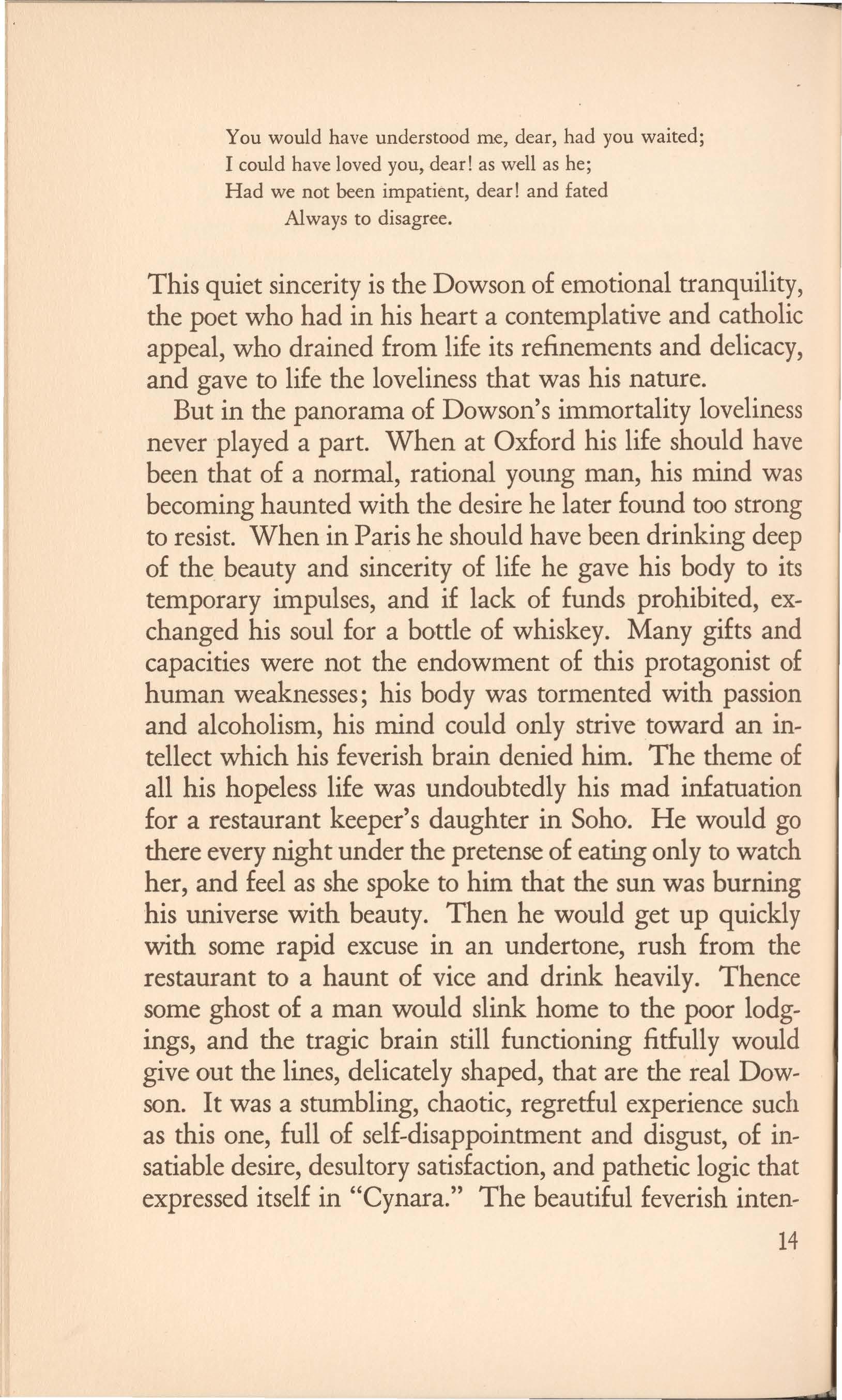
You would have understood me, dear, had you waited; I could have loved you, dear! as well as he; Had we not been impatient, dear! and fated Always to disagree.
This quiet sincerity is the Dowson of emotional tranquility, the poet who had in his heart a contemplative and catholic appeal, who drained from life its refinements and delicacy, and gave to life the loveliness that was his nature. But in the panorama of Dowson' s immortality loveliness never played a part. When at Oxford his life should have been that of a normal, rational young man, his mind was becoming haunted with the desire he later found too strong to resist. When in Paris he should have been drinking deep of the beauty and sincerity of life he gave his body to its temporary impulses, and if lack of funds prohibited, exchanged his soul for a bottle of whiskey. Many gifts and capacities were not the endowment of this protagonist of human weaknesses; his body was tormented with passion and alcoholism, his mind could only strive toward an intellect which his feverish brain denied him. The theme of all his hopeless life was undoubtedly his mad infatuation for a restaurant keeper's daughter in Soho. He would go there every night under the pretense of eating only to watch her, and feel as she spoke to him that the sun was burning his universe with beauty. Then he would get up quickly with some rapid excuse in an undertone, rush from the restaurant to a haunt of vice and drink heavily. Thence some ghost of a man would slink home to the poor lodgings, and the tragic brain still functioning .fitfully would give out the lines, delicately shaped, that are the real Dowson. It was a stumbling, chaotic, regretful experience such as this one, full of self-disappointment and disgust, of insatiable desire, desultory satisfaction, and pathetic logic that expressed itself in "Cynara." The beautiful feverish inten-

sity of these few verses is self-portraiture of a tired, frenzied mind.
Last night, ah, yesternight, betwixt her lips and mine There fell thy shadow, Cynara! thy breath was shed Upon my soul between the kisses and the wine; And I was desolate and sick of an old passion, Yea, I was desolate and bowed my head: I have been faithful to thee, Cynara! in my fashion.
Emotions expressed in lyrics such as this one result from enviable lives and appreciable minds, for they possess the deep possibility of epitomising an entire life. Here Dowson has for once said everything, and he has said it to an intoxicating and perhaps immortal music. Here in this song of passion and the passions, perpetuated by some unique energy of a temperament rarely so much the master of itself, meet the two conflicting elements of a strange soul, eternally at war with one another, quickening or deadening, and between them, destroying the body which it inhabits. Here is the writing that, while it stole the last pulses of vitality from a dying brain, belonged to a man whose heart knew well the depths of love and possessed a sensibility of emotions and a poetic delicacy quite in harmony with the graciousness of life. This is the man who gives us in sensitive vignettes of words the tragic story of an unrequited passion.
The curtain lifted, his acrimonious phase of life behind him, his aesthetic aplomb regained, Dowson introduces himself again as a charming young idealist of imagination, spirit and fancy. His melodies are no longer fraught with pain, his ecstasy no longer miserable, but filled with a certain sweet revelry he writes all the gladness of his heart into a pastel fantasy, and "The Pierrot of the Minute" emerges to make us love this lily-laden boy, so timid yet so eager for 15

romance. In Cupid's aerial haven a kiss is granted him by the Maiden of the Moon, who begs him
Watch, and forget all weary things of earth, All memories and cares, all joy and mirth, While my dance woos him, light and rhythmical, And weaves his heart into my coronal. Music, more music for his soul's delight: Love is his lady for a summer's night.
On the steps of a Doric Temple in the twilight glade of the Pare du Petit Trianon, a debilitant spirit has at last found peace. Words, graceful syllables, are spoken, yet no sound is heard. The clear laughter of a ~ranscendental love flows freely and the curiosity of a lonesome heart is satisfied. The union of two romantic souls is perfected, and with the sleep of dawn the silence becomes more mortal . . . the dream 1s over.
You were right, Dowson.-"What is the use of speech? Silence were fitter." A solitude of quiet in which your love is realized and your life forgotten.

BY SUE COOK MC CLURE
So thou art gone, and now about thy bed
Whereon thou liest in incomparable grace
Of youth, l step with soft, compassionate tread, And view with anguished grief thy poor, sealed face, Thy folded hands, thy whited, alien brow And shuttered eyes, thy feet. l will be strong, l will not weep nor cry out: surely now l must have learned to bear my grief, nor long For what implacable life denies. I light A candle at thy feet and head, l tell The hours, and try to disbelieve the night That hoods thee, nor all thy frantic strength dispel; In vain-what anguish is there more to bear Than this loneliness l cannot share?
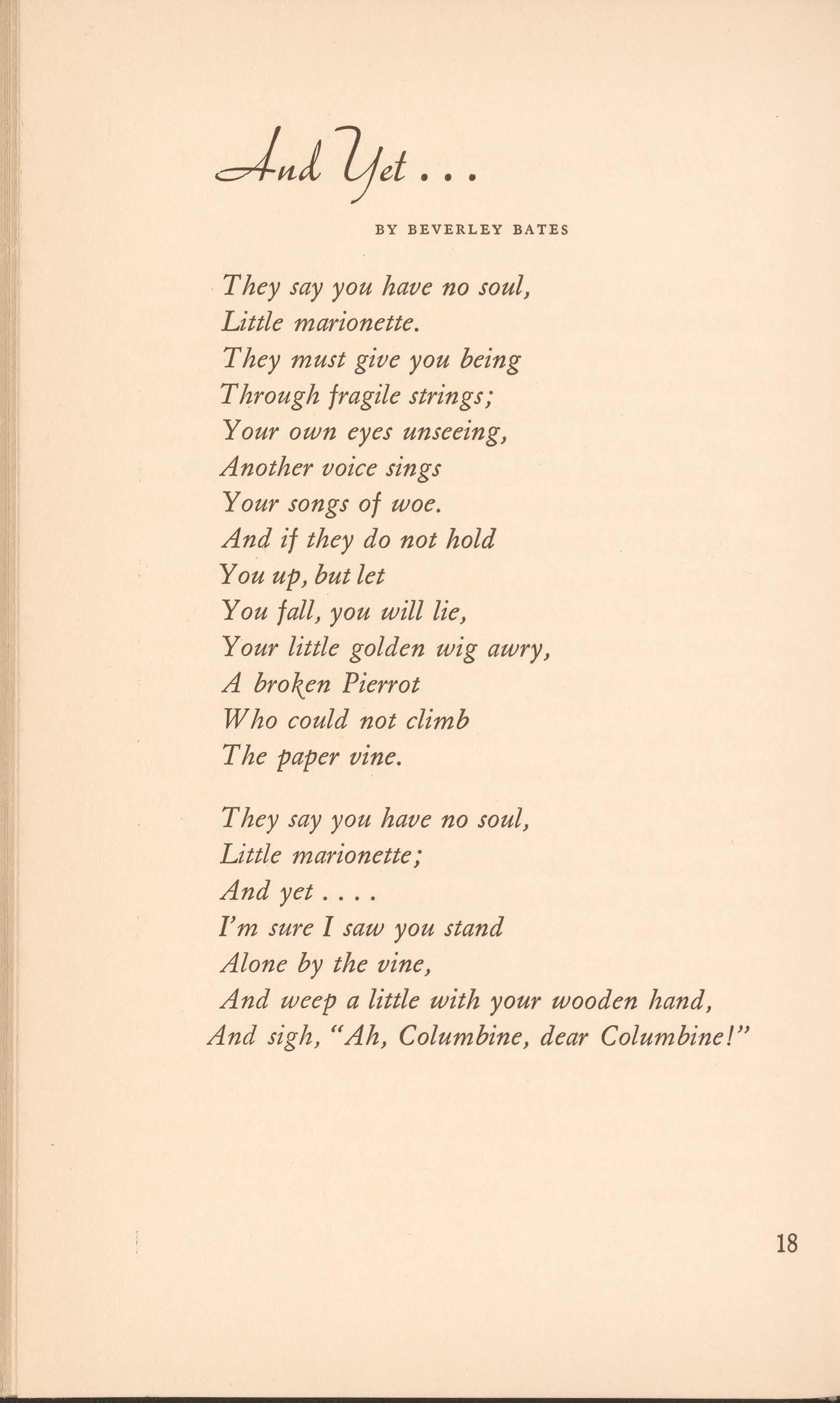
BY BEVERLEY BATES
They say you have no soul, Little marionette. They must give you being Through fragile strings; Your own eyes unseeing, Another voice sings Your songs of woe. And if they do not hold You up, but let You fall, you will lie, Your little golden tvig awry, A broken Pierrot Who could not climb The paper vine.
They say you have no soul, Little marionette; And yet ....
I'm sure I saw you stand Alone by the vine, And weep a little with your wooden hand, And sigh, "Ah, Columbine, dear Columbine!"

BY FRANCES FLICK
JOHNPatton, of the Shenandoah Valley of Virginia, came to Bakerstown, Pennsylvania, in the 1830's. He was a lusty youth with unkept hair, flowing brown mustaches, and fists and arms worthy of a Longfellow ode. The Pattons were fighters. They had been known for it in the Revolution, and the stock hadn't died out yet. Once in Pennsylvania, John set up a tanning establishment, though he knew full well that he wouldn't stick to that occupation any longer than he had to farming in the Valley.
He fell in love with an elfin Scotch girl named Margaret Cameron, who vociferously denied any similar feeling for him, and annoyed him no end with her haughty disdain and mischievous ways. One night the news came out that John Patton had killed a man-accidentally, perhaps, but killed all the same-in a brawl at the general store. John "skipped town," and wasn't heard of for three years. Margaret put off her jokes and prankish ways that night, and succeeding months gave her time to think about a dull future and a life without John Patton. When he returned one day from log-rolling and trading on the Mississippi, Margaret was a woman who knew what she wanted, ready to marry him and settle him down to being sober-minded. They had four children before John had to go West again; this time it wasn't because he was in trouble, but because, having once seen the Mississippi and the reticent, timber-covered Iowa bluffs above it, he had no choice but to return. Margaret, Bill, Jim, Sally, and Mary boarded the Allegheny flatboat with him, stood the temperamental journey down the Ohio, finally to dive into the Iowa wil19
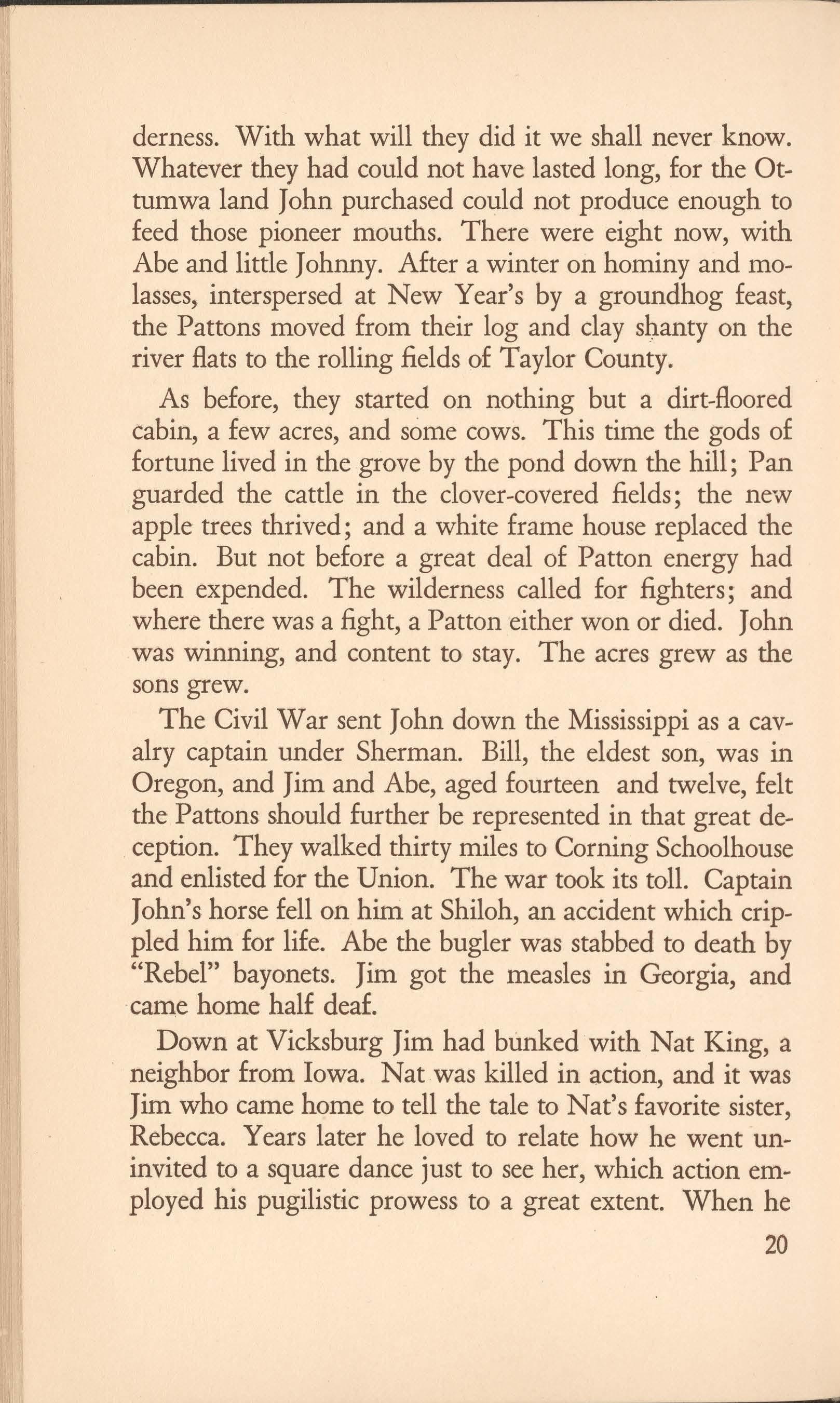
derness. With what will they did it we shall never know. Whatever they had could not have lasted long, for the Ottumwa land John purchased could not produce enough to feed those pioneer mouths. There were eight now, with Abe and little Johnny. After a winter on hominy and molasses, interspersed at New Year's by a groundhog feast, the Pattons moved from their log and clay shanty on the river flats to the rolling fields of Taylor County.
As before, they started on nothing but a dirt-floored cabin, a few acres, and some cows. This time the gods of fortune lived in the grove by the pond down the hill; Pan guarded the cattle in the clover-covered fields; the new apple trees thrived; and a white frame house replaced the cabin. But not before a great deal of Patton energy had been expended. The wilderness called for fighters; and where there was a fight, a Patton either won or died. John was winning, and content to stay. The acres grew as the sons grew.
The Civil War sent John down the Mississippi as a cavalry captain under Sherman. Bill, the eldest son, was in Oregon, and Jim and Abe, aged fourteen and twelve, felt the Pattons should further be represented in that great deception. They walked thirty miles to Corning Schoolhouse and enlisted for the Union. The war took its toll. Captain John's horse fell on him at Shiloh, an accident which crippled him for life. Abe the bugler was stabbed to death by "Rebel" bayonets. Jim got the measles in Georgia, and came home half deaf.
Down at Vicksburg Jim had bunked with Nat King, a neighbor from Iowa. Nat was killed in action, and it was Jim who came home to tell the tale to Nat's favorite sister, Rebecca. Years later he loved to relate how he went uninvited to a square dance just to see her, which action employed his pugilistic prowess to a great extent. When he 20
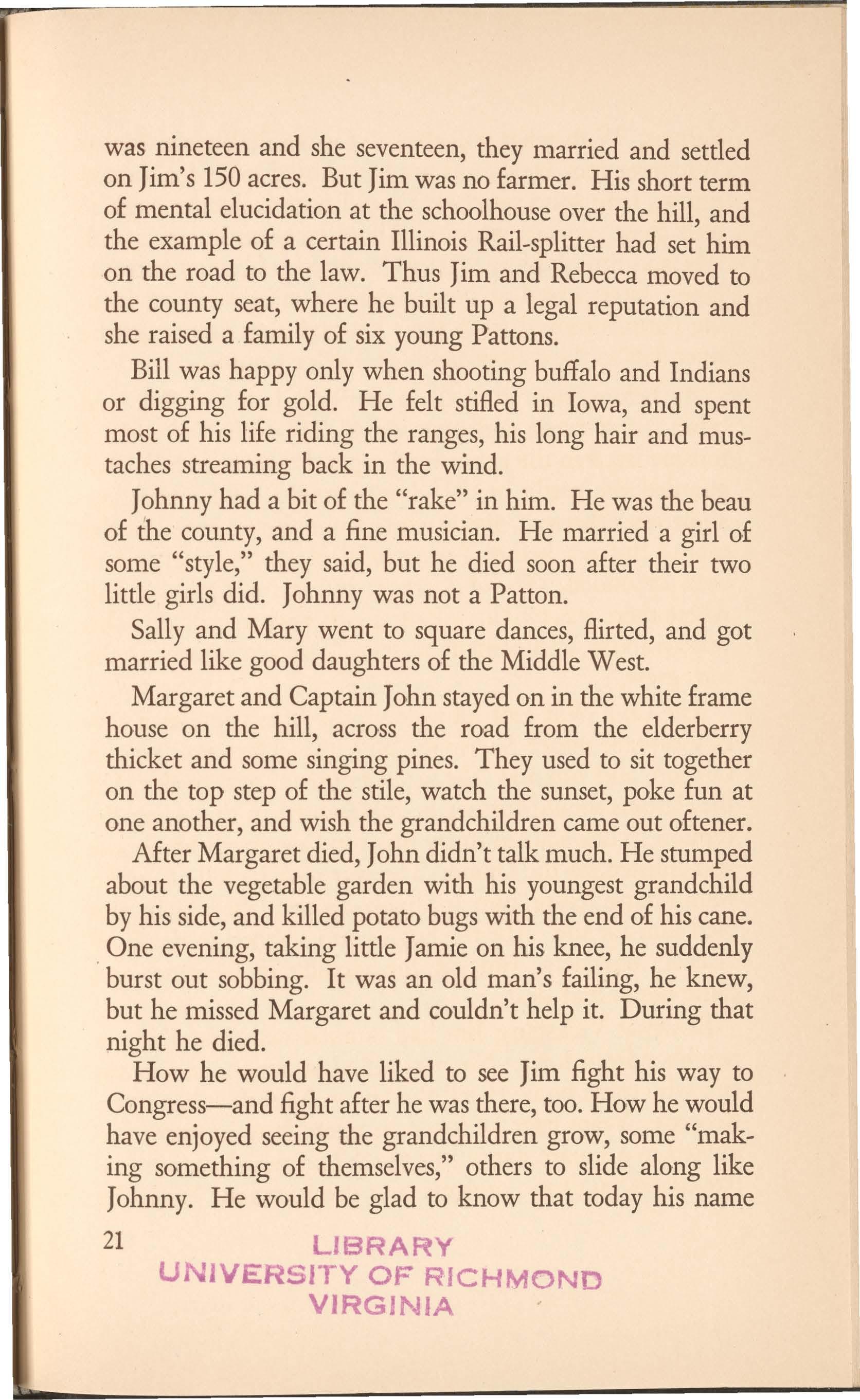
was nineteen and she seventeen, they married and settled on Jim's 150 acres. But Jim was no farmer. His short term of mental elucidation at the schoolhouse over the hill, and the example of a certain Illinois Rail-splitter had set him on the road to the law. Thus Jim and Rebecca moved to the county seat, where he built up a legal reputation and she raised a family of six young Pattons.
Bill was happy only when shooting buffalo and Indians or digging for gold. He felt stifled in Iowa, and spent most of his life riding the ranges, his long hair and mustaches streaming back in the wind.
Johnny had a bit of the "rake" in him. He was the beau of the county, and a fine musician. He married a girl of some "style," they said, but he died soon after their two little girls did. Johnny was not a Patton.
Sally and Mary went to square dances, flirted, and got married like good daughters of the Middle West.
Margaret and Captain John stayed on in the white frame house on the hill, across the road from the elderberry thicket and some singing pines. They used to sit together on the top step of the stile, watch the sunset, poke fun at one another, and wish the grandchildren came out oftener.
After Margaret died, John didn't talk much. He stumped about the vegetable garden with his youngest grandchild by his side, and killed potato bugs with the end of his cane.
. One evening, taking little Jamie on his knee, he suddenly burst out sobbing. It was an old man's failing, he knew, but he missed Margaret and couldn't help it. During that night he died.
How he would have liked to see Jim fight his way to Congress-and fight after he was there, too. How he would have enjoyed seeing the grandchildren grow, some "making something of themselves," others to slide along like Johnny. He would be glad to know that today his name
lives on the lips of Jim's grandchildren and their children, too, who were brought up on the tales of the hard days in Ottumwa County, the wretched war times, and the placid evenings on that cool, quiet hill that once was home.
Today these grandchildren of Captain John Patton read Proust, drive new Fords at breakneck speed, and go the general, jazzy way of their age. The fighting Patton blood is either dormant, or expends itself in the wear and tear of the machine age.
Every so often they go back to the graveyard in the pine grove across from the old farm. A gravestone under the most musical pine of all reads: "Captain John Patton, an American Patriot." Margaret lies there beside him.
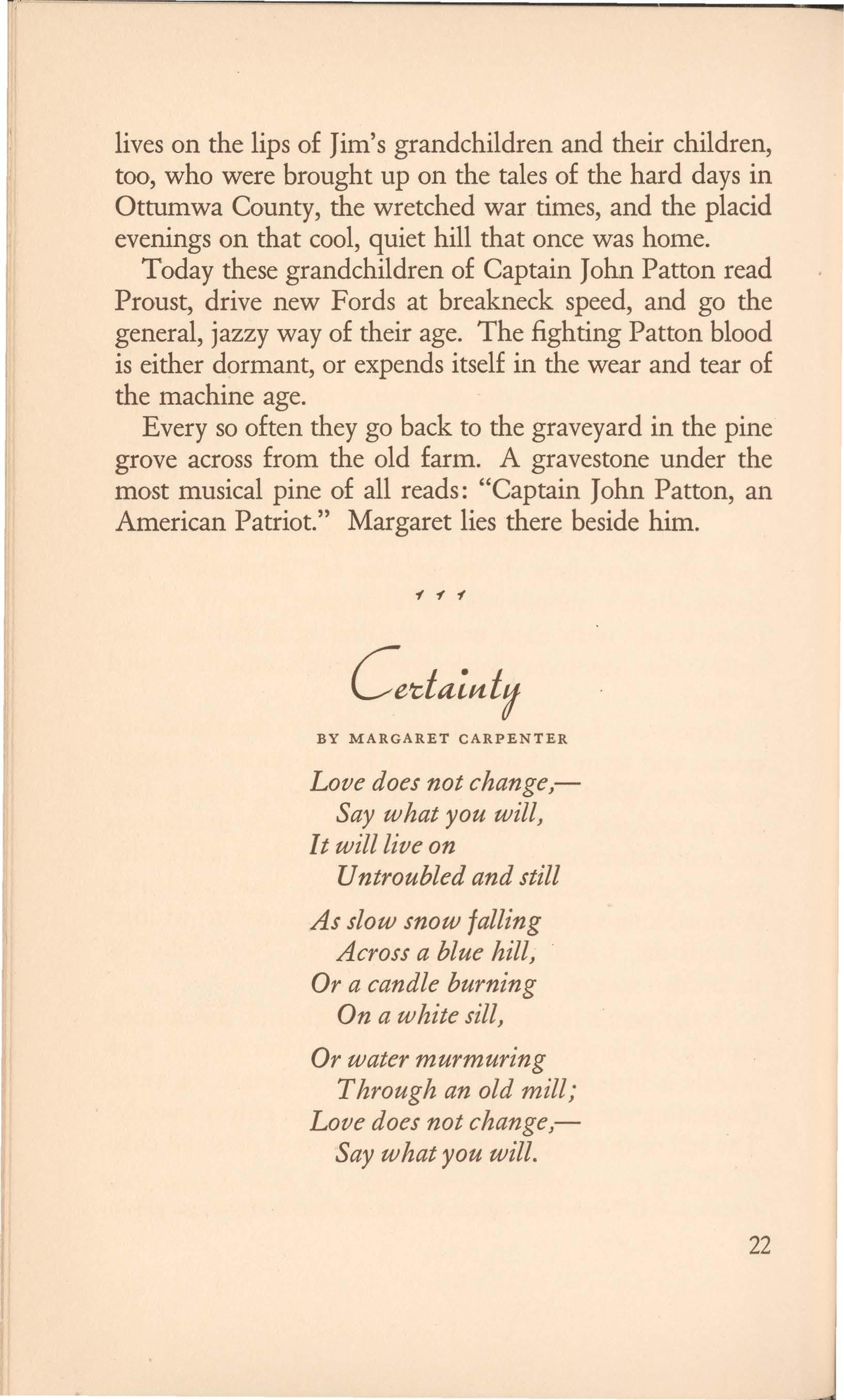
BY MARGARET CARPENTER
Love does not change,Say what you will, It will live on Untroubled and still
As slow snow falling Across a blue hill, Or a candle burning On a white sill, Or water murmuring
Through an old mill; Love does not change,Say what you will.

BY BLANCHE BRISTOW
"From the depth of the dre~my decline of the dawn through a notable nimbus of nebulous noonshme, Pallid and pink as the palm of the flag-flower that flickers with fear of the flies as they float, Are the looks of our lovers that lustrously lean from a marvel of mystic miraculous moonshine, These that we feel in the blood of our blushes that thicken and threaten with throbs through the throat?" 1
WHATutter absurdity is this that I am reading? No meaning is discernible here. Only a breathless desire to reach some unknown destination pervades the lines. As I proceed, the marvelous rhythmic tone of "Nephelidia" becomes slightly monotonous. What poet worthy of the name would write such wanton patter, such flowing nonsense ! Has Algernon Charles Swinburne's muse descended to this?
Some secret fascination draws me back to the abandoned poem, and again I vainly seek a logical center of understanding. What greets my senses is a pulsing motion darting in and out of a vaporous languor which overpowers me with sensations of tropical lethargy. But a will-o'-thewisp of elusive meaning draws after it my fluttering senses. Amused interest develops into blind determination; whither it leads me, I shall follow the stream of "Nephelidia" to its hidden source.
In the poet's letters there is no mention of this aimless fantasy. A biography furnishes a little information, periodicals a little more. My mysterious fragment of verse, fascinating me so completely, is merely an empty parody! The lull of the rhythm is an exaggeration of personal char-
1Algernon Charles Swinburne, "Nephelidia," A Book of Light Verse (1910), p. 411. "Nephelidia" appeared in the anonymous Heptalogia (1880). 23
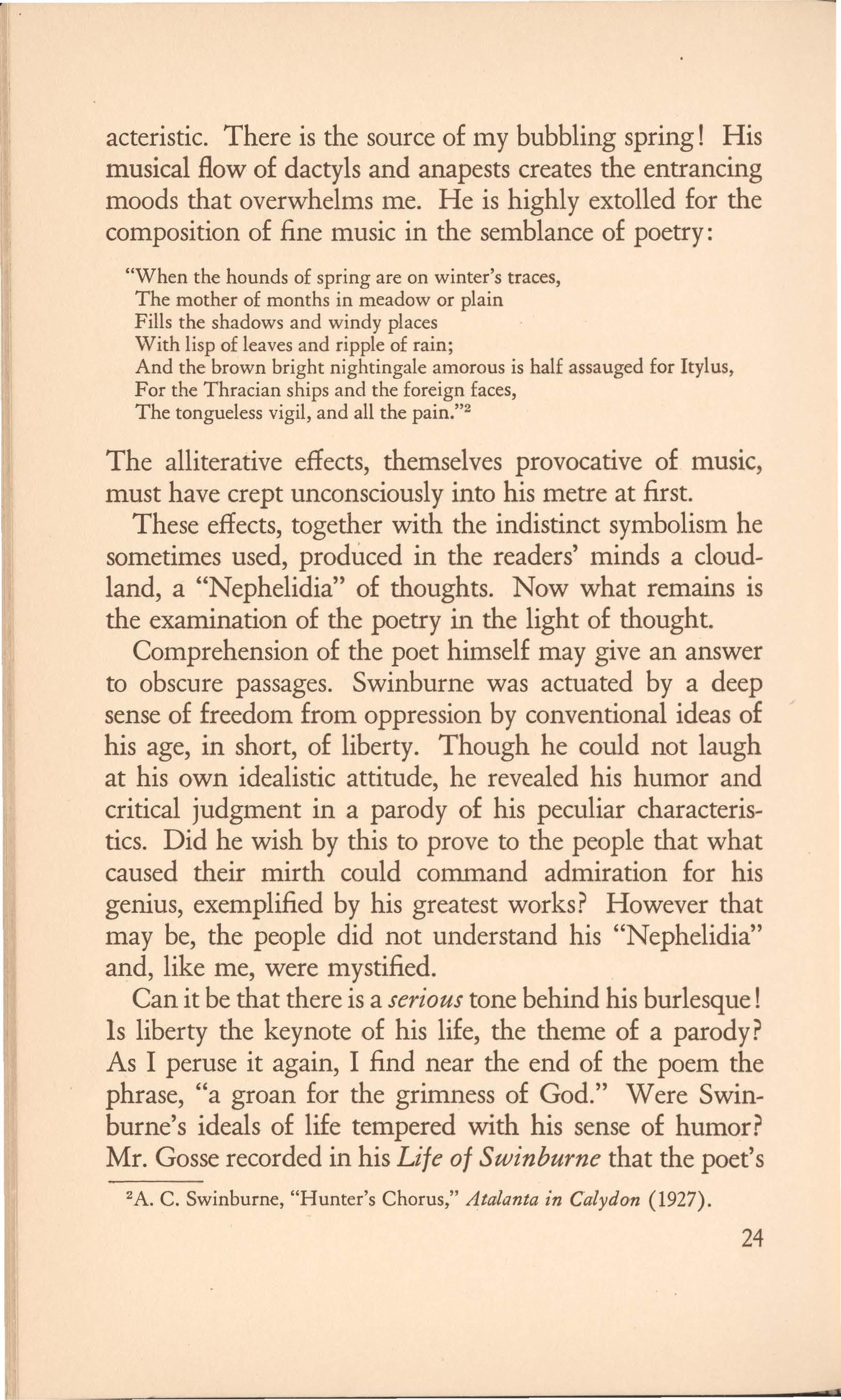
actenstlc. There is the source of my bubbling spring! His musical flow of dactyls and anapests creates the entrancing moods that overwhelms me. He is highly extolled for the composition of fine music in the semblance of poetry:
"When the hounds of spring are on winter's traces, The mother of months in meadow or plain Fills the shadows and windy places ·with lisp of leaves and ripple of rain; And the brown bright nightingale amorous is half assauged for Itylus, For the Thracian ships and the foreign faces, The tongueless vigil, and all the pain." 2
The alliterative effects, themselves provocative of music, must have crept unconsciously into his metre at first.
These effects, together with the indistinct symbolism he sometimes used, produced in the readers' minds a cloudland, a "Nephelidia" of thoughts. Now what remains is the examination of the poetry in the light of thought. Comprehension of the poet himself may give an answer to obscure passages. Swinburne was actuated by a deep sense of freedom from oppression by conventional ideas of his age, in short, of liberty. Though he could not laugh at his own idealistic attitude, he revealed his humor and critical judgment in a parody of his peculiar characteristics. Did he wish by this to prove to the people that what caused their mirth could command admiration for his genius, exemplified by his greatest works? However that may be, the people did not understand his "Nephelidia" and, like me, were mystified.
Can it be that there is a serious tone behind his burlesque! ls liberty the keynote of his life, the theme of a parody? As I peruse it again, I find near the end of the poem the phrase, "a groan for the grimness of God." Were Swinburne's ideals of life tempered with his sense of humor? Mr. Gosse recorded in his Life of Swinburne that the poet's
2 A. C. Swinburne, "Hunter's Chorus," Atalanta in Calydon (1927).
conversation was characterized by a certain whimsicality of tone. Cannot philosophy and humor play together here?
As I consider "Nephelidia," the absurdities that troubled me vanish. The burlesque remains, but in addition, I enjoy a suggestion of his mirth at the expense of the Victorians.
It has been admitted that "Nephelidia" is a parody of Swinburne's style; could it not also have been a burlesque of thr~conventional Victorian patterns?
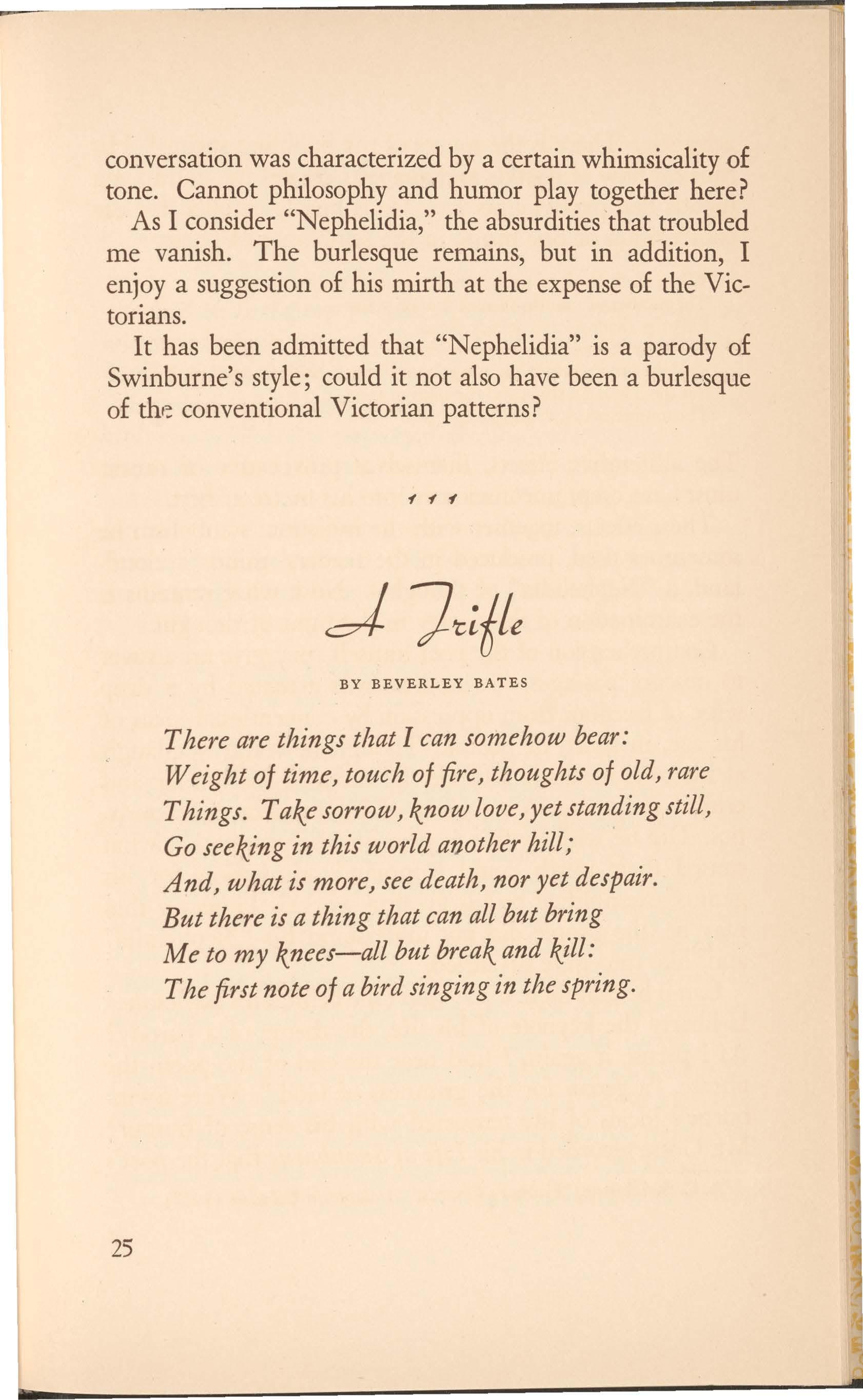
BY BEVERLEY BATES
There are things that I can somehow bear: Weight of time, touch of fire, thoughts of old, rare Things. Take sorrow, know love, yet standing still, Go seeking in this world a1Jotherhill; And, what is more, see death, nor yet despair. But there is a thing that can all but bring Me to my knees-all but break and kill: The first note of a bird singing in the spring.
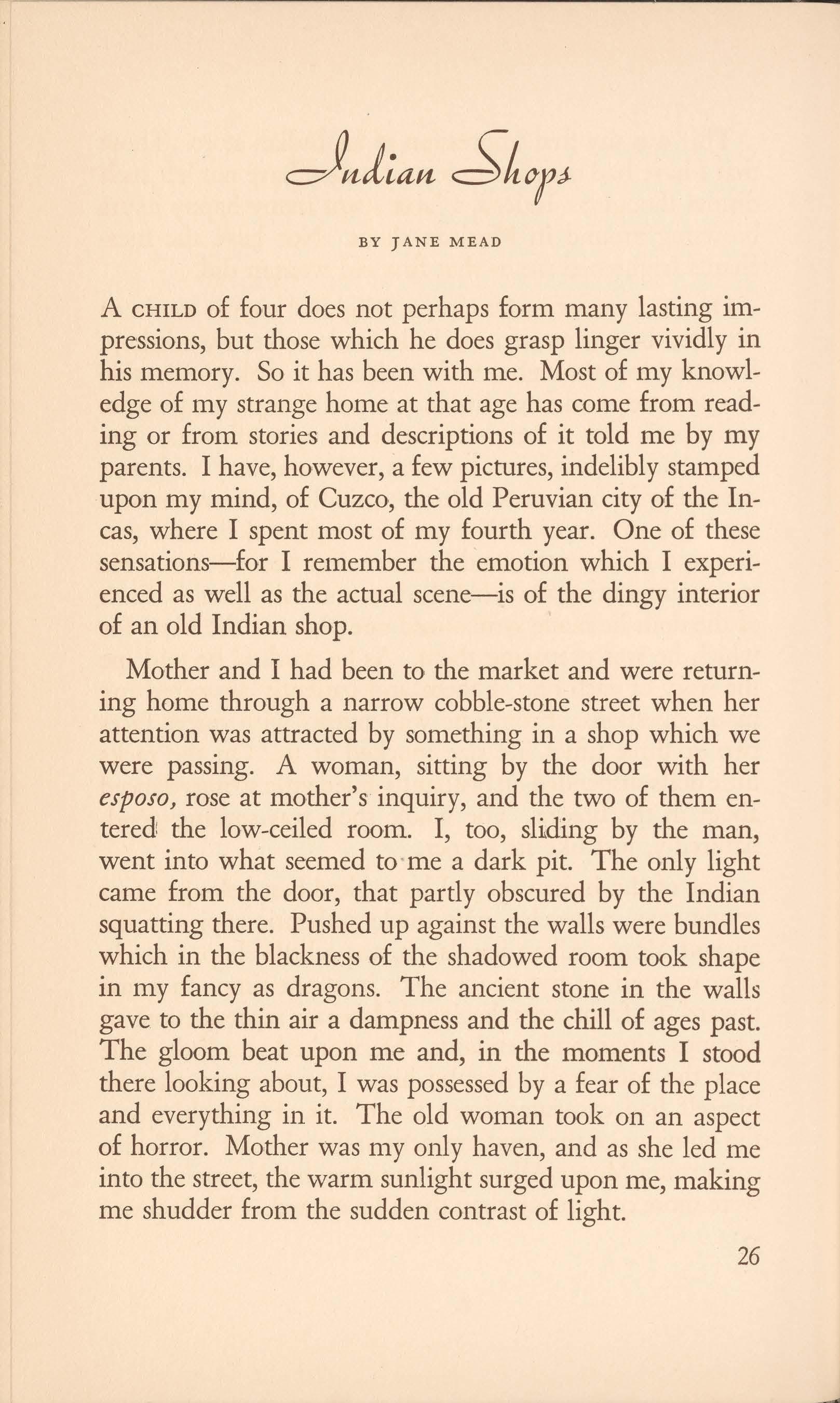
BY JANE MEAD
A CHILD of four does not perhaps form many lasting impressions, but those which he does grasp linger vividly in his memory. So it has been with me. Most of my knowledge of my strange home at that age has come from reading or from stories and descriptions of it told me by my parents. I have, however, a few pictures, indelibly stamped upon my mind, of Cuzco, the old Peruvian city of the Incas, where I spent most of my fourth year. One of these sensations-for I remember the emotion which I experienced as well as the actual scene-is of the dingy interior of an old Indian shop.
Mother and I had been to the market and were returning home through a narrow cobble-stone street when her attention was attracted by something in a shop which we were passing. A woman, sitting by the door with her esposo, rose at mother's inquiry, and the two of them entered: the low-ceiled room. I, too, sliding by the man, went into what seemed to ·me a dark pit. The only light came from the door, that partly obscured by the Indian squatting there. Pushed up against the walls were bundles which in the blackness of the shadowed room took shape in my fancy as dragons. The ancient stone in the walls gave to the thin air a dampness and the chill of ages past. The gloom beat upon me and, in the moments I stood there looking about, I was possessedby a fear of the place and everything in it. The old woman took on an aspect of horror. Mother was my only haven, and as she led me into the street, the warm sunlight surged upon me, making me shudder from the sudden contrast of light.

This was my first impression of an Indian store. Those that I have had occasion to see since then have not left such dismal thoughts. Indeed, I have spent many happy hours browsing around in Mexican shops. Nor have the merchants frightened me as that first old woman did.
On a side street in Oaxaca, a delightful city in southern Mexico, there is an inviting little mask-maker's workshop. I entered this through a wide arch in the pink plaster side of a one-story building. Inside, an open door gave a glimpse of the patio with its bright bushes and tropical flowers. The room had no windows, but was light and airy with sun streaming in both doors. In the middle of the room was the mask-maker himself at work shaping dolls and costumes to fill the racks and benches near the entrance. He was an interesting man, half Indian and half Spanish. Each of the dolls he made symbolized one phase of the fiesta for which he was preparing them. As he worked he told me the story of each one of them and patiently answered my many questions. From one wall masks with queer faces two or three times life size mocked at us. On the racks little dolls suspended on brilliantly hued ixtle strings danced about in the breeze. The whole shop was smiling goodnaturedly, just like its keeper.
One of the Indian shops I have liked best belonged to a young man, a jeweler, who made authentic copies of the ancient Monte Alban jewels. It was a little shop, scarcely large enough for five people to be in at one time. In a case toward the front were displayed elaborate reproductions of earrings, rings, and pendants. He worked at a little table near the back wall. Around him were treasures that he himself had excavated from the tombs. He could quote the opinions of the most eminent archaeologists in Mexico concerning Monte Alban and its riches, but his own beliefs were more convincing than those he quoted. His shop was 27

one of a master craftsman and a student. The very walls seemed to speak, telling me stories of the life of an ancient civilization.
Tradition which had descended through endless centuries manifested itself in a gayer, lighter mood at the potter's shop. This shop began at the curb of the sunny street, then extended back across the dirt walk and into a very small room, or rather hole, elevated knee-high in the side of a thick wall. There was some gaudy ware painted with . the birds of the Aztecs and T oltecs, some unglazed earthen ware, and much shiny, dark green ware all beautifully shaped in the classiclines known to the race. Benches with rows of vessels were pushed against the wall, the only orderly part of the place; for the floor was piled high with the fragile pieces and crowded with pots full of old fascinating toy dishes, whistles, and banks. I still marvel that, with the rough treatment the pottery received, few pieces were broken. As the young shop tender, with her baby slung on her back, and I hunted around through the crowded place, I found myself comparing the pottery with the Indian who created it. They were so similar, these two, so little changed since the time of Montezuma. Both possessed beauty of form and were children of the sun, toughened by it to stand work and use; both were intimate with the earth, the one being composed of it, the other using it as his shelter and his livelihood. Most evident of all was the simplicity which dominated each. This Indian girl was truly an integral part of her shop.
Another ancient art was displayed at the weaver's who had his shop in his home. The patio was filled with flowers and huge dye vats. . In one corner was a doorway through which could be seen racks of showy materials. Quite in contrast with the potter's shop, this house bustled with organization. There was, however, a . peculiar lack in the 28
stock of goods for, search as I would, I could find sets of nothing. Match, the pieces just didn't. Each strip of weaving was a new experiment, an adventure for the craftsman. I have visited many other Indian shops. Most of them have been small and dark, but each has had an interesting and outstanding feature. Each has had a mood and character all its own, and they have always had a fortunate lack of resemblance to the monotony of average American shops.

BY ELIZABETH LEWIS
I laughed when you said That I couldn't live Without the solace That only friends give,
And feigned so cold And hard a mask That people, inquisitive, Began to ask
If I had found Release From mortal care, And peace; But few were aware . Of the bitterness Of that cold, Cold stare.
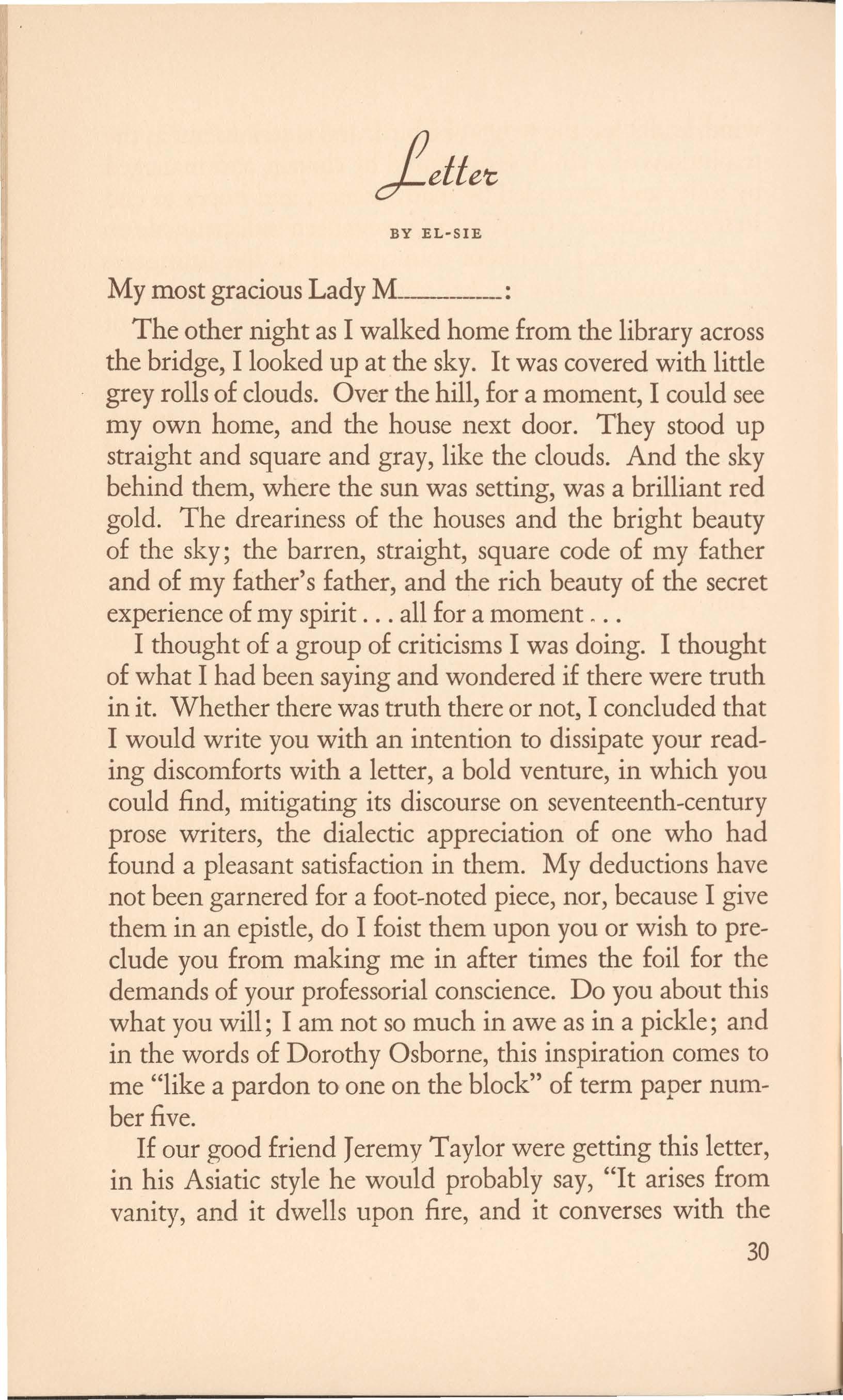
BY EL·SIE
My most gracious Lady M __ _
The other night as I walked home from the library across the bridge, I looked up at the sky. It was covered with little grey rolls of clouds. Over the hill, for a moment, I could see my own home, and the house next door. They stood up straight and square and gray, like the clouds. And the sky behind them, where the sun was setting, was a brilliant red gold. The dreariness of the houses and the bright beauty of the sky; the barren, straight, square code of my father and of my father's father, and the rich beauty of the secret experience of my spirit ... all for a moment . ..
I thought of a group of criticisms I was doing. I thought of what I had been saying and wondered if there were truth in it. Whether there was truth there or not, I concluded that I would write you with an intention to dissipate your reading discomforts with a letter, a bold venture, in which you could find, mitigating its discourse on seventeenth-century prose writers, the dialectic appreciation of one who had found a pleasant satisfaction in them. My deductions have not been garnered for a foot-noted piece, nor, because I give them in an epistle, do I foist them upon you or wish to preclude you from making me in after times the foil for the demands of your professorial conscience. Do you about this what you will; I am not so much in awe as in a pickle; and in the words of Dorothy Osborne, this inspiration comes to me "like a pardon to one on the block" of term paper number five.
If our good friend Jeremy Taylor were getting this letter, in his Asiatic style he would probably say, "It arises from vanity, and it dwells upon fire, and it converses with the 30

wind, and it has the wings of a bird, and is serious but as the resolutions of a child, commenced by chance, and managed by folly, and proceeded by inadvertency, and hopes to end in forgetfulness." (Taylor has always been indispensable on great occasions.) Without commenting on the fittingness of his remark, I say he has got modernity of vocabulary there; he's got style, too, fluency of language, figures of speech. Taylor has sincerity in his writing. His sermons are cosmopolitan, simple, clear. In part he has something of Donne; in part he suggests Pepys; altogether he is an eloquent man in his own right. The freshness and charm of Holy Living and Holy Dying is a half-expected pleasure to the reader: it is the solemnity of phrase, the tolerant thought, the consciousness of an end to pain, that have made them so. Again, he is like Milton to Milton's prose: "But as when the sun approaches toward the gates of morning, he first opens a little eye of heaven, and sends away the spirits of darkness, and gives light to a cock, and calls up the lark to matins, and by and by gilds the fringes of a cloud, and peeps over the eastern hills, thrusting out his golden horns, like those which decked the brows of Moses when he was forced to wear a veil because himself had seen" (sounds a little Irish here, doesn't it? Irish-English, I mean) "the face of God ... "
I have selected Taylor as one of the men of prose that has stood up in my mind square and straight against the brilliancy of his fiery age. "May my spark grow greater by kindling my brother's taper," he has asked. I add my hope to this prayer. ·
Once I thought of Fuller as coming next with his God's plenty. But only for a time did I consider this anecdotemonger, this discerner and non-observist, this little fat man with his most dignified and sublime prose. He is not straight and square; rather he squats on the ground with his tales. There is a man who better serves my picture. I give you the 31

prose of . Browne; his Hydriotaphia, solemn and majestic, is in the words of your Saint (--Y), the greatest piece of prose written.
Sir Thomas Browne is not a stark realist; he does not show up in his writing, therefore, the rich happenings of the life in which he lived. But even so, I should have to agree with your saint that he has ability as a writer. His greatness lies in his form. (And one must know form if he is to write. It is the form which matters most-at least it is absolutely necessary-while the matter is of secondary importance.)
To me his figures are gigantic, like the figures in Benton's murals. And yet they are in reality no bigger than the ones you and I could draw on a telephone pad, no more beautiful. It is his touch that has made them great, that has made them beautiful. He writes with a desire to carve out of fancy things once magnificent. "We conceive not these urns to . have descended thus naked as they appear, or to have entered their graves without the habit of flowers. The urn of Philopoemen was so laden with flowers and ribbons that it afforded us sight of itself. The rigid Lycurgus allowed olive and myrtle." Again, "no lamps, included liquors, lacrymatories, or tear bottles, attended these rural urns, either as sacred unto the manes, or passionate expressions of their surviving friends. While with rich flames, and hired tears, they solemnized their obsequies, and in the most lamented monuments made one part of their inscriptions."
The melodious quality of the prose, strengthening, as it did in the middle period of the seventeenth century, the relationship between itself and poetry is nowhere exemplified more purely than in the work of Sir Thomas.
* * * *
With the growing consciousness that I have already penned my quota in honor of Donne, I bring him back again lest you call to me as I pass your window to say "You'll
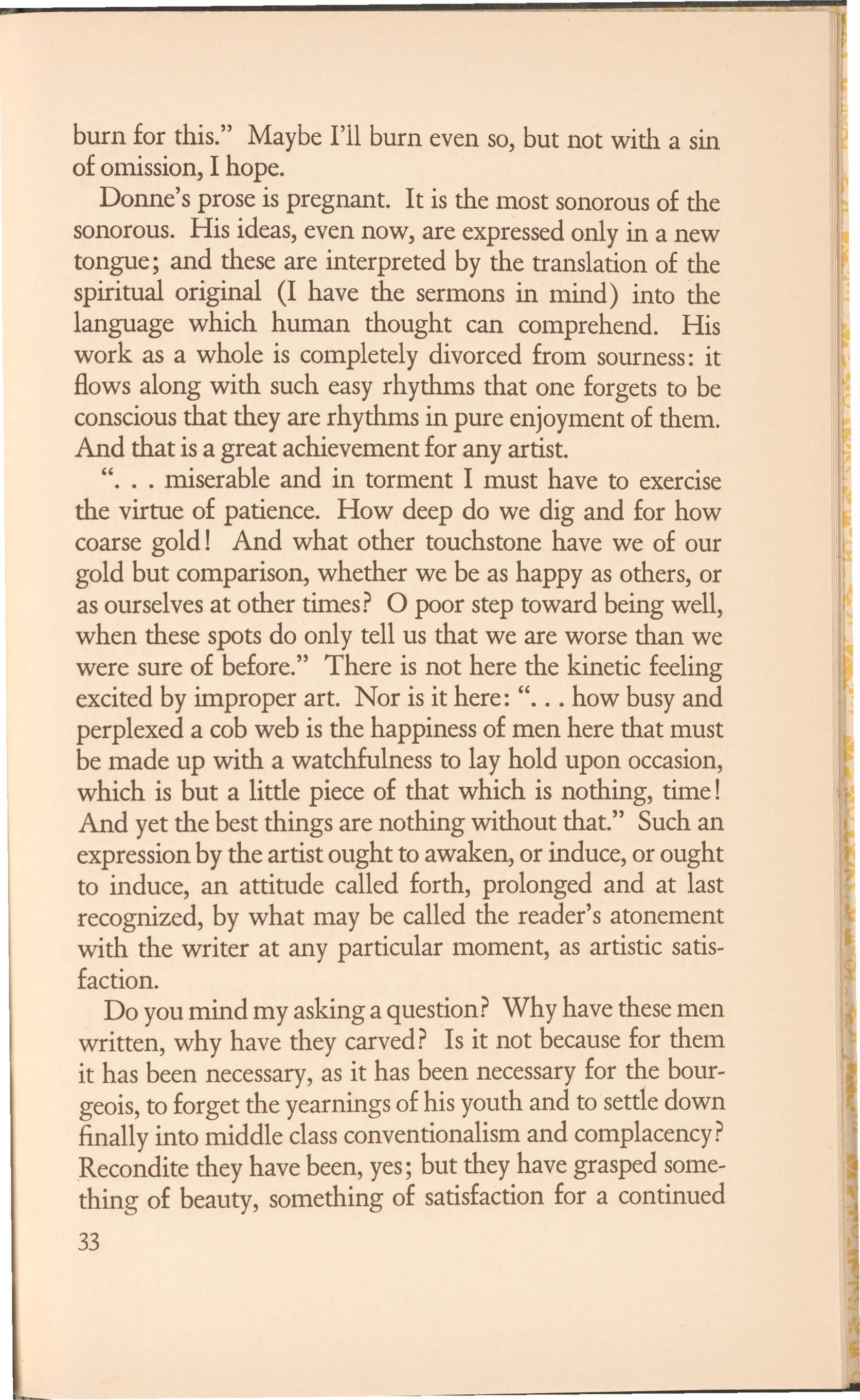
burn for this." Maybe I'il burn even so, but not with a sin of omission, I hope.
Donne's prose is pregnant. It is the most sonorous of the sonorous. His ideas, even now, are expressed only in a new tongue; and these are interpreted by the translation of the spiritual original (I have the sermons in mind) into the language which human thought can comprehend. His work as a whole is completely divorced from sourness: it flows along with such easy rhythms that one forgets to be conscious that they are rhythms in pure enjoyment of them. And that is a great achievement for any artist.
". . . miserable and in torment I must have to exercise the virtue of patience. How deep do we dig and for how coarse gold! And what other touchstone have we of our gold but comparison, whether we be as happy as others, or as ourselves at other times? 0 poor step toward being well, when these spots do only tell us that we are worse than we were sure of before." There is not here the kinetic feeling excited by improper art. Nor is it here:" ... how busy and perplexed a cob web is the happiness of men here that must be made up with a watchfulness to lay hold upon occasion, which is but a little piece of that which is nothing, time! And yet the best things are nothing without that." Such an expression by the artist ought to awaken, or induce, or ought to induce, an attitude called forth, prolonged and at last recognized, by what may be called the reader's atonement with the writer at any particular moment, as artistic satisfaction.
Do you mind my asking a question? Why have these men written, why have they carved? Is it not because for them it has been necessary, as it has been necessary for the bourgeois, to forget the yearnings of his youth and to settle down finally into middle class conventionalism and complacency? Recondite they have been, yes; but they have grasped something of beauty, something of satisfaction for a continued 33
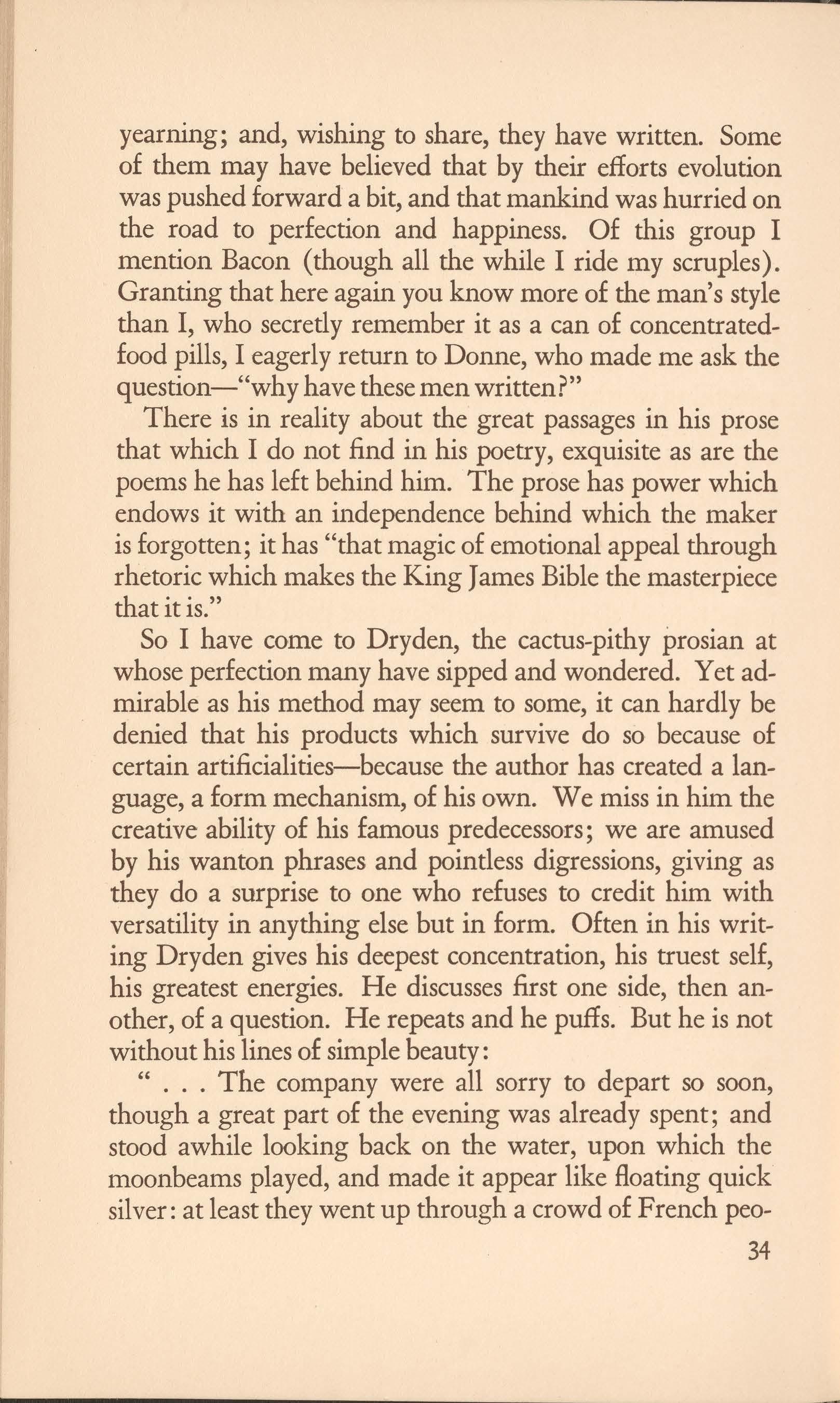
yearning; and, wishing to share, they have written. Some of them may have believed that by their efforts evolution was pushed forward a bit, and that mankind was hurried on the road to perfection and happiness. Of this group I mention Bacon (though all the while I ride my scruples). Granting that here again you know more of the man's style than I, who secretly remember it as a can of concentratedfood pills, I eagerly return to Donne, who made me ask the question-"why have these men written?"
There is in reality about the great passages in his prose that which I do not find in his poetry, exquisite as are the poems he has left behind him. The prose has power which endows it with an independence behind which the maker is forgotten; it has "that magic of emotional appeal through rhetoric which makes the King James Bible the masterpiece that it is."
So I have come to Dryden, the cactus-pithy prosian at whose perfection many have sipped and wondered. Yet admirable as his method may seem to some, it can hardly be denied that his products which survive do so because of certain artificialities-because the author has created a language, a form mechanism, of his own. We miss in him the creative ability of his famous predecessors; we are amused by his wanton phrases and pointless digressions, giving as they do a surprise to one who refuses to credit him with versatility in anything else but in form. Often in his writing Dryden gives his deepest concentration, his truest self, his greatest energies. He discusses first one side, then another, of a question. He repeats and he puffs. But he is not without his lines of simple beauty:
" . . . The company were all sorry to depart so soon, though a great part of the evening was already spent; and stood awhile looking back on the water, upon which the moonbeams played, and made it appear like floating quick silver: at least they went up through a crowd of French peo-

ple, who were merrily dancing in the open air, and nothing concerned for the noise of guns which had alarmed the town that afternoon."
* * * *
After time has made its deductions, after it has solved in its own way many of the problems with which they have been concerned and obliterated even the memory of most of the antagonists against whom they struggled, there is something worthy left over, something which does not come to us faintly across time like the sentiments of perhaps the Victorians, but something which gives us the illusion of not existing in time at all, something as swift and moving, yet everliving, as the mirage of one's own home as it stands against the sky. I have thought of Taylor, Donne, Browne, and Dryden as straight and square as it. I have pictured the times behind them as the brilliant red gold of the sun behind it.
Kneeling on the floor, under the ceiling, behind every door ... -not a creature is stirring, not even a-come Blixon, come- . . . I have looked for things. Books that might have been borrowed from you. I had hoped and not without reason for at least one. And so, since there is not one, thereby making it impossible for me to write the sensible phrase "attached herewith, find," I must become "another admirer" ... Gracious Lady, I have found something ... Oh, you do not know ... but it is here. I cannot grasp it or cover it with tissue and tinsel. Nor can I return it. Found but not lost, 20, 30, 40, 50, 60, 70, 80, or ninety bright hours in the past, to be remembered, never to become faded ... unless ... unl ... no-no ...
For the last time I sit up after twelve; for the last time I run such risks for you. Many times I have hesitated. Now I shall stop entirely. But wait! There is a clatter in the corner. It is a mouse. He clambers over the edge of the table and hops onto this. Minutes reading, then he gives a hideous 35

squeak of scorn and wild noises of sneering and jeering. The fool, what does he know about things? ... but does he? ... And so I murder him ... one hundred rings in this roller. Still on his absurd thin face there is a smirk.
The other night I walked home from the library across the bridge. That is excusable. But, I looked up at the sky ... With many esteems and wishes, in direst need, but ever thy humble
May 29, 1935.





